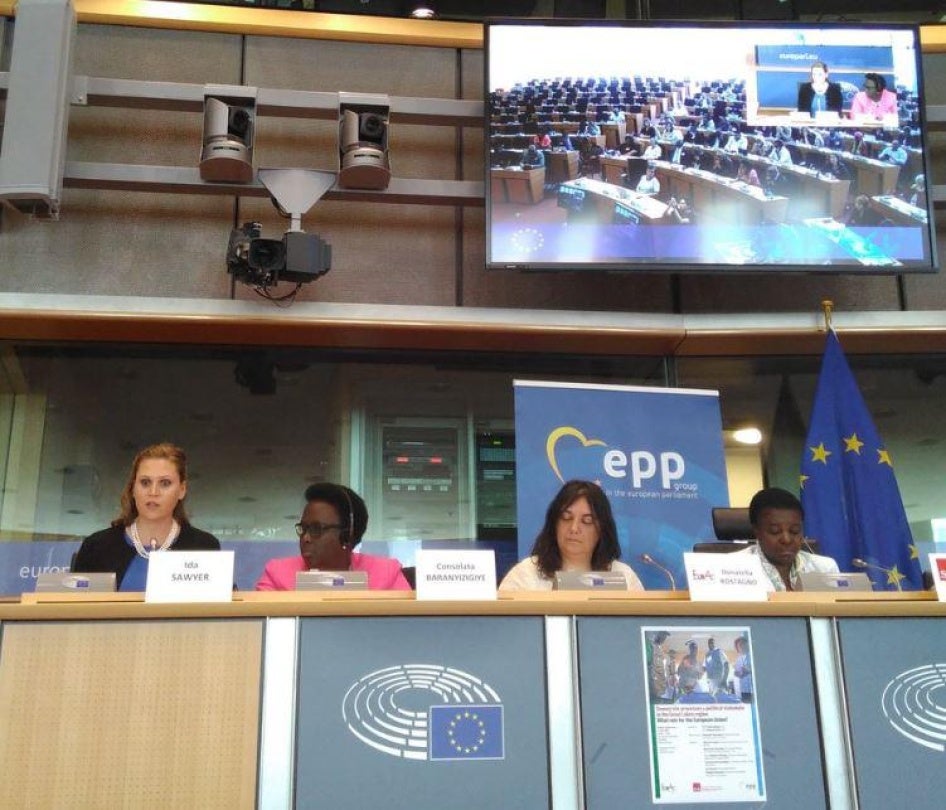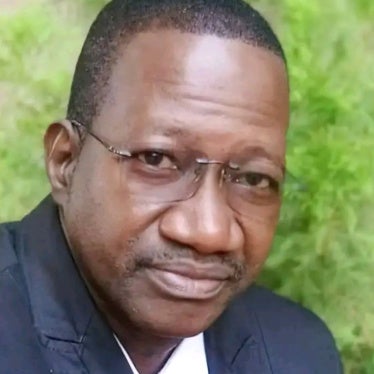Across the Great Lakes region, leaders have tried to maintain a façade of democracy – organizing elections, or at least talking about organizing elections – while trampling on the basic rights and freedoms that are fundamental to any real democracy, and appearing ready to use all means necessary to remain in power.
In Burundi, the country has descended into lawlessness since April 2015, when President Pierre Nkurunziza announced his bid for a disputed third term, despite the two-term limit set forth in the Arusha Accords. The political framework, signed in 2000, was the first of several power-sharing agreements between belligerents intended to end the country’s civil war. Government security forces and members of the ruling party’s youth league, known as the Imbonerakure, cracked down on protesters and critics of Nkurunziza’s government. Nkurunziza won reelection in July 2015, after an election plagued by violence and boycotted by the opposition.
Over the past two years, government repression continued as attempts by international and regional leaders to bring Burundi’s political factions together for talks continue to stall. Hundreds of people have been killed, and many others tortured or forcibly disappeared. The country’s once vibrant independent media and nongovernmental organizations have been decimated, and more than 400,000 people have fled the country. Armed opposition groups have also attacked security forces and ruling party members, including police and Imbonerakure.
In July 2016, the UN Security Council adopted a resolution authorizing the deployment of 228 unarmed police to Burundi to support UN human rights observers, but Burundian authorities have refused the deployment. In September 2016, the UN Human Rights Council adopted a resolution to establish a commission of inquiry into human rights violations in Burundi since April 2015, and to determine whether they may constitute international crimes. Burundian officials have so far refused to work with the commission.
While Nkurunziza may seem defiant and unaffected by international pressure, more could be done to show top officials in Burundi that there are consequences for the violence and repression. The UN Security Council could impose targeted sanctions, including travel bans and asset freezes, against individuals responsible for ongoing serious human rights violations.
In the Democratic Republic of Congo, President Joseph Kabila has held on to power by delaying elections and overseeing a brutal crackdown against those calling for him to step down. After much bloodshed and two years of political repression leading up to the December 19, 2016, deadline that marked the end of his constitutionally mandated two-term limit, participants at talks mediated by the Catholic Church signed an agreement on New Year’s Eve 2016. It included a clear commitment that presidential elections will be held before the end of 2017, that Kabila will not seek a third term, and that there will be no referendum to change the constitution. While many hoped the deal would be a big step toward Congo’s first democratic transition since independence, the prospect of democratic elections by year’s end in Congo seems to be moving further and further away. Congo’s ruling coalition is not only defying key tenets of the New Year’s Eve agreement, but government forces are meting out unchecked political repression and large-scale human rights abuses. The lack of implementation of the deal is starting to seem like yet another delaying tactic to keep President Kabila in power. In a recent rare interview with the German outlet Der Spiegel, Kabila did not rule out the possibility of a third term, and he made no clear commitments on when elections would be organized.
The new targeted sanctions announced last week by the EU against a militia leader and eight senior Congolese government and security force officials – including the head of the intelligence agency and two government ministers – sent a strong message that there are consequences for government repression, serious human rights violations, and elections delays. The new US sanctions announced a few days later helped present a united front from Congo’s main Western donors. But it seems more needs to be done to put enough pressure on Kabila. The UN Security Council should also impose targeted sanctions on those responsible for serious human rights abuses, and the EU and US should stand ready to impose additional sanctions if the situation doesn’t improve – going higher up the chain of command and targeting the business interests of those responsible for the abuses and election delays. The African Union and regional leaders should also press Kabila to end the abuses and urgently organize credible elections.
In Rwanda, the crackdown on dissent might appear more discreet to outside observers, but it’s no less effective. For many Rwandans, the upcoming elections this August are a fait accompli.
Recent elections in Rwanda have had a familiar outcome: overwhelming support for the ruling Rwandan Patriotic Front (RPF), amid a dearth of opposition candidates. President Paul Kagame won the 2003 presidential elections with more than 95 percent of the vote, and garnered 93 percent in 2010. The RPF won the 2008 parliamentary elections with about 79 percent, and took 76 percent of the 2013 vote. The 2015 referendum allowing President Kagame to stay in power until 2034 passed with 98.4 percent of the vote.
As the RPF secured one victory after another, opposition leaders and supporters alleged that political opponents have been killed, forcibly disappeared, imprisoned, or stymied by bureaucratic hurdles.
In the run-up to presidential elections in 2010, André Rwisereka, the vice president of the Green Party, was found with his head severed in a field. He had been under pressure to leave the Green Party and rejoin the RPF. Another opposition leader, Victoire Ingabire, president of the Forces Democratiques Unifiées (FDU)-Inkingi opposition party, was arrested in Kigali in 2010 and sentenced to eight years in prison in 2012, following a flawed trial that included politically motivated charges. In December 2013, the Supreme Court extended this sentence to 15 years. Illuminée Iragena, another member of the FDU-Inkingi, went missing on March 26, 2016, and is now presumed dead. Just before Iragena went missing, another FDU-Inkingi member, Léonille Gasengayire, was arrested for having visited Ingabire in prison.
Journalists and civil society activists have also been targeted. The elections will take place this year in an atmosphere in which journalists are reluctant to challenge the government narrative. There is some open debate on Kinyarwanda talk radio programs and online via the diaspora press, but by and large, normal Rwandan voters will not be exposed to free and fair debate around government policies. Journalists are regularly reminded not to step out of line. In the lead-up to the 2010 elections, Jean-Léonard Rugambage – a prominent independent journalist – was shot dead in front of his home in Kigali. A primary international news outlet for most Rwandans, the BBC Kinyarwanda service, has been blocked since October 2014, depriving many Rwandans of an important source of independent information. The former head of the Rwanda Media Commission, Fred Muvunyi, resigned and fled in May 2015 after challenging the decision to block the BBC.
Civil society organizations working on political and civil rights or freedom of speech are now almost non-existent in Rwanda after years of intimidation and interference. The government favors service-delivery over any type of human rights reporting or advocacy. The only organization that is somewhat able to operate is Human Rights League in the Great Lakes Region (LDGL), but their former executive secretary was forced to leave Rwanda last year.
As part on an apparent effort to spread fear and prevent any citizen from speaking out against the government, poor people, those who criticized government decisions regarding land disputes, suspected political or military opponents, and suspected petty criminals have been arbitrarily arrested, held in illegal detention centers, and in some cases executed, disappeared, tortured, or mistreated.
In this context, President Kagame will run for a third term in the August election. Only one opposition party is registered, the Green Party, and only three individuals have expressed an interest in challenging Kagame and the RPF. In the past, the Green Party’s activities were so severely stymied by bureaucratic hurdles that they could not campaign. Difficulties continue today as independent candidates allege threats, harassment, and temporary arrests of supporters as they attempt to collect signatures required to be on the ballot. One of the presidential candidates, Diane Rwigara, is the daughter of a well-known former RPF supporter and businessman who died under suspicious circumstances in a car accident in early 2015. Within 24 hours of announcing her bid, nude photos started to circulate of Rwigara on social media sites.
Despite weak prospects for opposition candidates, authorities appear to be taking no chances. On May 1, new regulations were published restricting candidates’ use of social media. The regulation required parties or individuals who wish to campaign on Facebook, Twitter, WhatsApp, Instagram, YouTube, or other websites to submit the content for approval to the National Electoral Commission (NEC) 48 hours in advance, as of July 14, first day of the campaign. As smartphone usage increases across Rwanda, social media will be an important and relatively inexpensive way for candidates to reach thousands of voters, critique government policies, and offer alternative solutions. The regulations proposed amounted to censorship and a blatant attack on freedom of expression.
Yet in a clear sign that Rwanda’s international partners still have influence, the NEC reversed its decision late last week. This followed criticism from within Rwanda and strong statements from the US, the UK, the Netherlands, Germany, and the EU, expressing their serious concerns about the restrictions on social media.
The EU and Rwanda’s other partners should take a stronger stance in speaking out against, and showing there are real consequences for, the Rwandan government’s many attempts to clamp down on free expression and quash dissent.
There’s a long way to go, but if European leaders work in partnership with the people of the Great Lakes region and help defend fundamental freedoms – while avoiding blind support for abusive leaders – the region’s worrying shift towards repressive rule might be reversed.
Thank you.









